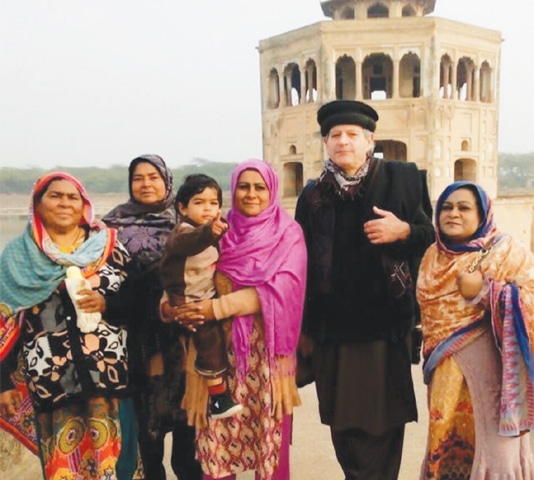
Eric Alabaster, a Jewish American musician, recalls being a “pure gora” back in the 1990s. This was before the New Yorker met the late Ustaad Mulazim Hussain, a tabla nawaz from Pakistan, and his life changed forever.
Today his music studio in the Brooklyn neighbourhood of Midwood — also known as “Little Pakistan” — tells a different story. Entering the windowless basement studio is like being instantly transported from New York to South Asia.
An Ajrak hangs on one wall. Persian, Pakistani and Afghan rugs are placed on the floor, with cushions and gao takias spread throughout the room. Various instruments are stacked in one corner of the studio; there is a piano, a drum set, tablas, a harmonium and some speakers. Behind the equipment a framed sketch of Mehdi Hassan is placed on a shelf.
Sitting on one of the rugs, Alabaster skilfully plays the tabla as Abdul Wahid Malik, one of his Pakistan-origin neighbours, sings Mehdi Hassan’s ‘Dil Veeran Hai’. Alabaster knows the lyrics and coyly sings along, but is clearly more comfortable playing the instrument.
How it all started
Mulazim Hussain migrated to the United States in the 1990s. Here the tabla player from the Punjab town of Pindigheb met Alabaster, who was primarily a drummer back then.
Alabaster was taken by the ustaad’s command of the tabla. He recalls being 42 years old and afraid to start learning such a labour-intensive instrument. He told Hussain: “I would like to learn, but I’m already a grown-up man.”
But great teachers help students conquer their fears. Alabaster not only went on to learn the tabla, but also became so interested in the culture that he has continued to explore it even after his ustaad’s passing in 2003. Every week, he meets South Asian musicians at his studio, which has been rebranded as ‘Eric Ki Baithak’ [Eric’s gathering].
Sharing music and beyond
So what exactly is Eric Ki Baithak? The musician describes it as “a place where we sit, talk, socialise and share music”. Every Friday, musicians from the South Asian community, primarily Pakistanis, get together at the Brooklyn-based studio.
Alabaster’s interest in Pakistan goes beyond music, however. He has also started to learn Urdu and can read and write in the language with some fluency.
At our insistence, he shows off his linguistic skills and says “Pakistan aik buhut ameer mulk music ke baray main, paise ke baray main nahin, lekin music ke baray main buhut ameer mulk hai.” [Pakistan is a very rich country, not in terms of money but in terms of music].
He stresses that his interaction with musicians from the country have had a profound impact on him.
“I’ve noticed they always ask ‘Ijazat hai?’ [‘Do we have your permission?’] before they will play,” he says. “I think that the Desi and Pakistani community has changed me in this way… to have more respect and defer to one’s elders.”
This ‘respect’ comes through when he speaks about senior Pakistani musicians who inspire him. “Listening to Madam Noor Jehan was one of the things that anchored me, and really, like a fish I was hooked,” he recalls.
And then he comes back to late Ustaad Mulazim Hussain — Alabaster’s friend, teacher and, perhaps, the biggest influence.
Pakistan: a second home
After moving to the US, Hussain spent the rest of his life here. Over the years, the two men started considering each other family. “He helped me be a better father to my daughter,” Alabaster says, remembering his friend.
“He was like an uncle to my daughter and like a brother-in-law to my wife.”
Unfortunately, Hussain was unable to spend much time with his own children back in Pakistan. “His son never got to meet him and his daughters did not know him because they were very young when he left,” says Alabaster.
The late tabla nawaz would stay in touch with his family via telephone; sometimes Alabaster would also speak to them.
After his passing, Alabaster has been able to meet Hussain’s family a number of times. “I have been to Pakistan four times now,” he tells Dawn.
The first time he went to Pakistan was in 2006. When he got to Hussain’s hometown a rickshaw driver came to pick him up. “He knew who I was and I started to cry.” The rickshaw driver knew that Alabaster had a relationship with this tabla player from Pindigheb.
Alabaster has subsequently visited Pakistan with his daughter, who is also a musician. This was to attend the wedding ceremony of Hussain’s daughter.
“My second home is there in his village, with his family,” Alabaster says.
He hopes to visit Pakistan for a longer duration but says: “I just have this constraint about not being able to get a long visa. [That is] something I am trying to arrange, a longer visa so I can stay for more than one month at a time.”
Meanwhile, he continues to welcome musicians and artists from the region to his studio. It seems Eric Ki Baithak is his little re-creation of Pakistan — the perfect way to bring together both the places he considers home.
Published in Dawn, April 14th, 2017














































Dear visitor, the comments section is undergoing an overhaul and will return soon.